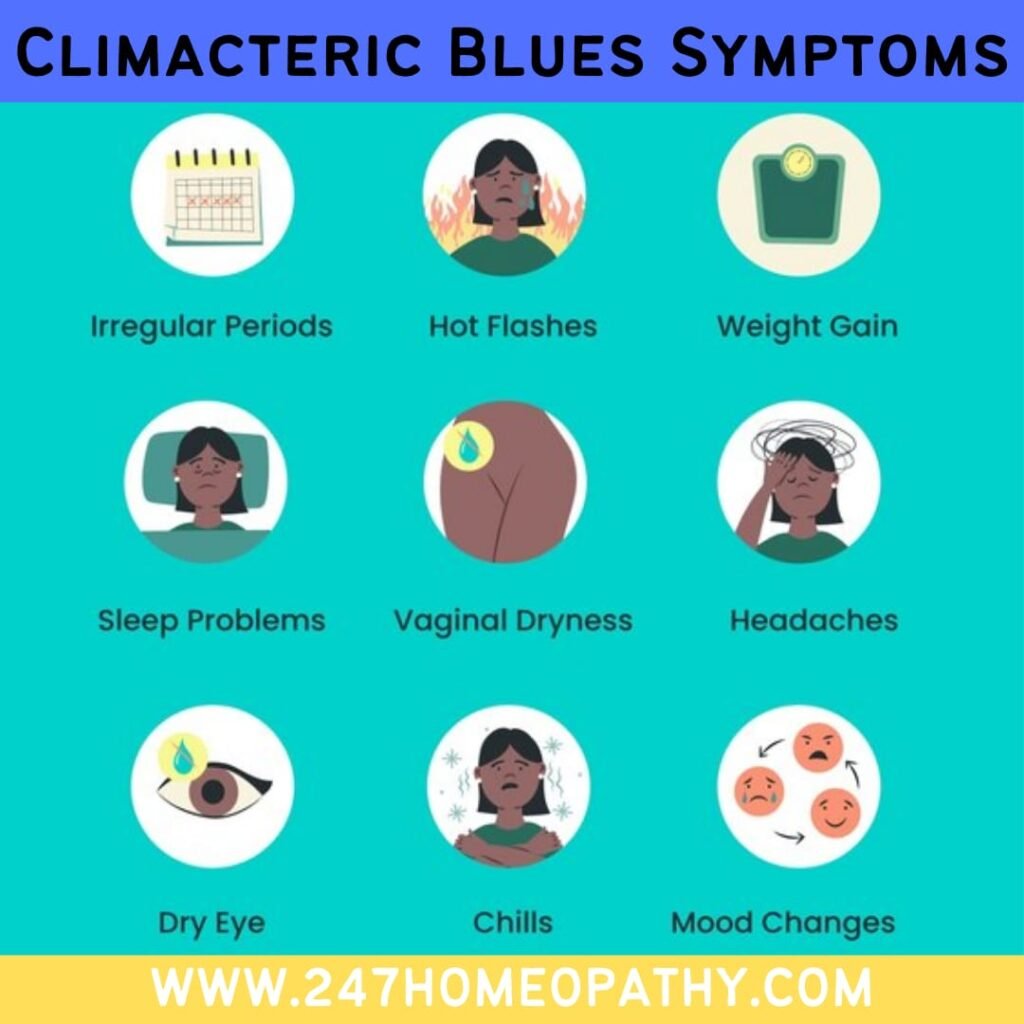
Climacteric Blues
The climacteric period includes the perimenopausal period, menopausal (cessation of menses), and post-menopausal period.
It accompanies various health consequences. These consequences result from the decline of ovarian hormones which alter brain neurotransmitters and provokes menopausal symptoms such as osteoporosis (weakness of bones and joints), musculoskeletal pains, increased risk of coronary heart disease, mood disorders, poor sleep quality, depression, Alzheimer’s disease (forgetfulness), hot flushes, irritability, night sweats.
Risk Factors-

- Climacteric blues is not seen in all women who goes through this period but it is more likely to be seen in Women with a history of premenstrual syndrome or postpartum depression.
- Diagnosis with depression prior to menopause.
- Sedentary lifestyle (lack of exercise or physical activity).
- Smoking.
- Negative feelings towards menopause or the thought of aging.
- Stressful life events such as job stress, personal life problems, death of parents are common in this stage of life.
Sign and symptoms-
Although most women make the transition into menopause without experiencing depression but some women experience symptoms of moodiness, anxiety, stress, and decreased sense of well-being.
It may vary from just feeling stressed or blue to clinically depressed/major depressed.
Major depression is a condition associated with a chemical imbalance in the brain and changing hormones during the perimenopausal period.
Symptoms Include –
- Prolonged tiredness
- Low energy
- Loss of interest in normal activities Sadness
- Irritability
- Sleep disturbances
- Agitation
- Weight changes
- Decreased sex drive
These Above Symptoms Have to Last for More Than Two Weeks to Suggest Major Depression.
Some other symptoms of climacteric blues include –
- Persistent sad, anxious mood
- Hopelessness feeling
- Irritability
- Feeling of worthlessness, helplessness, guilt feeling Decreased energy or fatigue
Loss of interest or pleasure in hobbies and activities Moving or talking more slowly
Difficulty sleeping, early awakening, or oversleeping Restlessness or having trouble sitting still
Management of Climacteric Blues-
Deep breathing- Mindful and deep breathing can help reduce anxiety, Doing this for 15 minutes a day will help bring down stress levels.
Involve in exercise and physical activity- Regular exercise can release serotonin and serotonin is known as the happy hormone. Indulging in regular exercise reduces stress levels.
B vitamins- Vitamin B can be important to the mental and emotional well-being of perimenopausal women. Food containing these B vitamins includes dairy products, leafy green vegetables, and beans. Vitamin B is also available in supplement form.
Relax and wind down before sleep by reading a book, listening to music, or taking a lukewarm water bath.
A cup of chamomile tea will help you to relax. Avoid caffeine and alcohol and quit smoking.
Homoeopathic medicines-
Cimicifuga- This remedy has a very good affinity for ovaries and uterus complaints. Great depression with dreams of impending evil. Fears riding in a closed carriage, of being obliged to jump out. Incessant talking.
Lachesis- Climacteric troubles, palpitation, flashes of heat, vertex headache, great loquacity are some marked symptoms of this remedy. Sadness in the morning, no desire to mix with the world. Does not wish to attend to business. Wants to be off somewhere all the time.
Ignatia Amara- Changeability in mood, overthinking silently brooding, melancholic, sad, tearful. Not communicative. Sighing and sobbing. Grief and disappointment.
Amyl Nitrosum- Climacteric headache and flushes of heat with great anxiety and palpitations. Hiccough and yawning. Flushes of face, heat, and throbbing in the head.
